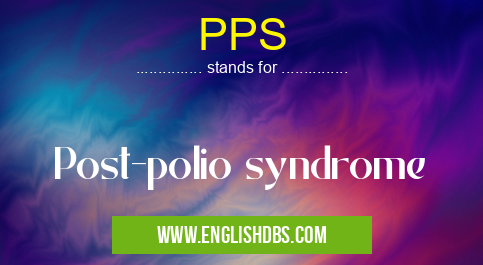What does PPS mean in NEUROLOGY
Post-polio syndrome (PPS) is a condition that can develop in people who have had polio. PPS can occur decades after the initial polio infection and can cause a variety of symptoms.

PPS meaning in Neurology in Medical
PPS mostly used in an acronym Neurology in Category Medical that means Post-polio syndrome
Shorthand: PPS,
Full Form: Post-polio syndrome
For more information of "Post-polio syndrome", see the section below.
What is PPS?
PPS is a late-onset condition that can affect people who have had polio. It typically occurs 15 to 40 years after the initial infection. PPS can cause a variety of symptoms, including:
- Muscle weakness or pain
- Fatigue
- Difficulty breathing
- Difficulty swallowing
- Sleep problems
- Cognitive problems
- Emotional problems
Causes of PPS
The exact cause of PPS is unknown. However, it is thought to be caused by damage to the motor neurons in the spinal cord and brain stem. These neurons are responsible for controlling muscle movement. Over time, the damage to these neurons can lead to the development of PPS symptoms.
Symptoms of PPS
The symptoms of PPS can vary from person to person. Some people may only experience mild symptoms, while others may experience more severe symptoms. The most common symptoms of PPS include:
- Muscle weakness or pain
- Fatigue
- Difficulty breathing
- Difficulty swallowing
- Sleep problems
- Cognitive problems
- Emotional problems
Diagnosis of PPS
There is no specific test for PPS. However, a doctor may diagnose PPS based on a person's medical history and symptoms. A doctor may also order tests to rule out other conditions that could be causing the symptoms.
Treatment of PPS
There is no cure for PPS. However, there are treatments that can help to manage the symptoms. These treatments may include:
- Exercise
- Physical therapy
- Occupational therapy
- Speech therapy
- Medications
Essential Questions and Answers on Post-polio syndrome in "MEDICAL»NEUROLOGY"
What is Post-Polio Syndrome (PPS)?
PPS is a condition that can develop years or even decades after recovery from a polio infection. It is characterized by a range of symptoms, including muscle weakness, fatigue, and pain.
What causes PPS?
The exact cause of PPS is unknown, but it is thought to be related to damage caused to the nerves and muscles during the initial polio infection.
Who is at risk for developing PPS?
Anyone who has had polio is at risk for developing PPS, but it is more common in people who were infected with polio as children.
What are the symptoms of PPS?
The symptoms of PPS can vary from person to person, but they may include:
- Muscle weakness
- Fatigue
- Pain
- Difficulty breathing
- Speech problems
- Swallowing problems
- Cognitive problems
How is PPS diagnosed?
PPS is diagnosed based on a person's medical history, symptoms, and a physical examination.
How is PPS treated?
There is no cure for PPS, but treatment can help to manage the symptoms. Treatment may include:
- Physical therapy
- Occupational therapy
- Speech therapy
- Pain medication
- Fatigue management techniques
Final Words: PPS is a chronic condition that can affect people who have had polio. The symptoms of PPS can vary from person to person. There is no cure for PPS, but there are treatments that can help to manage the symptoms.
PPS also stands for: |
|
| All stands for PPS |
